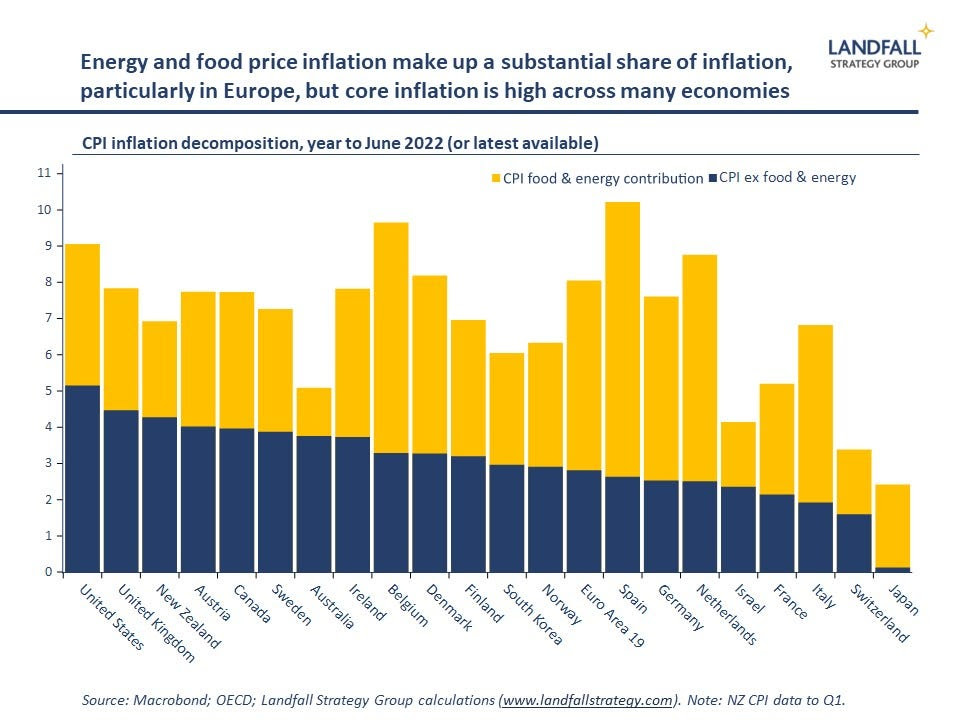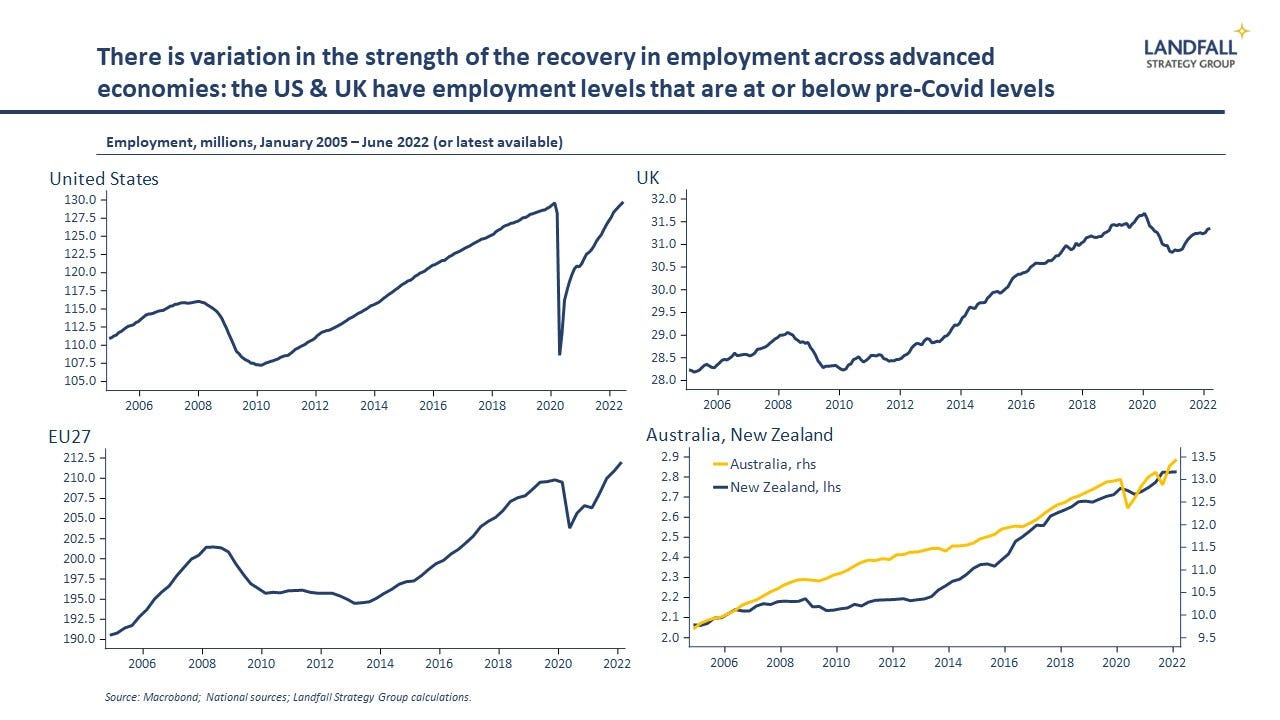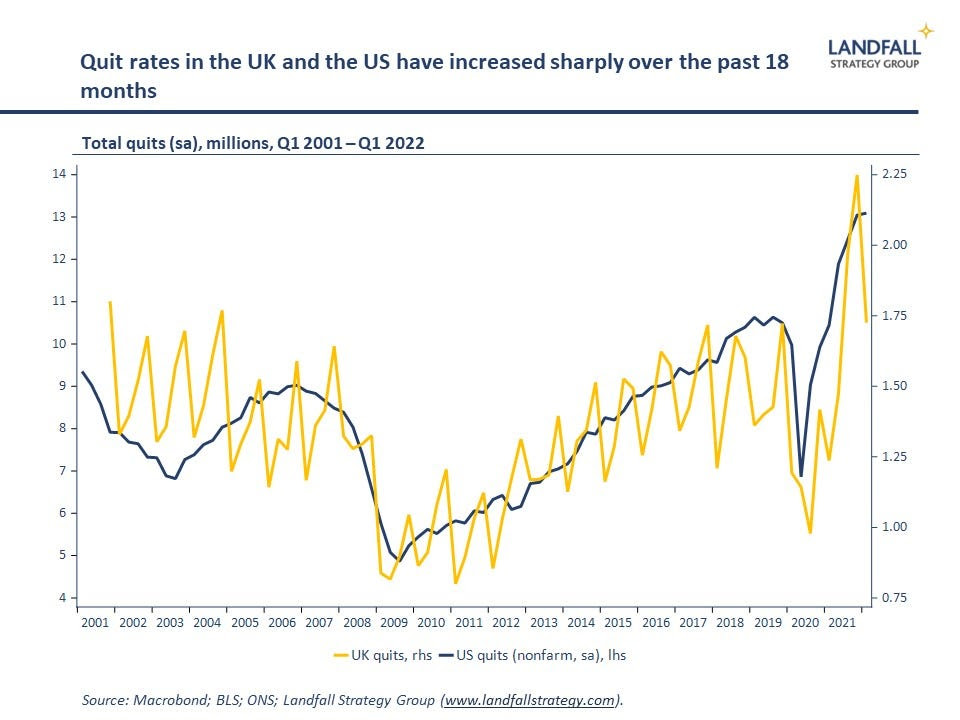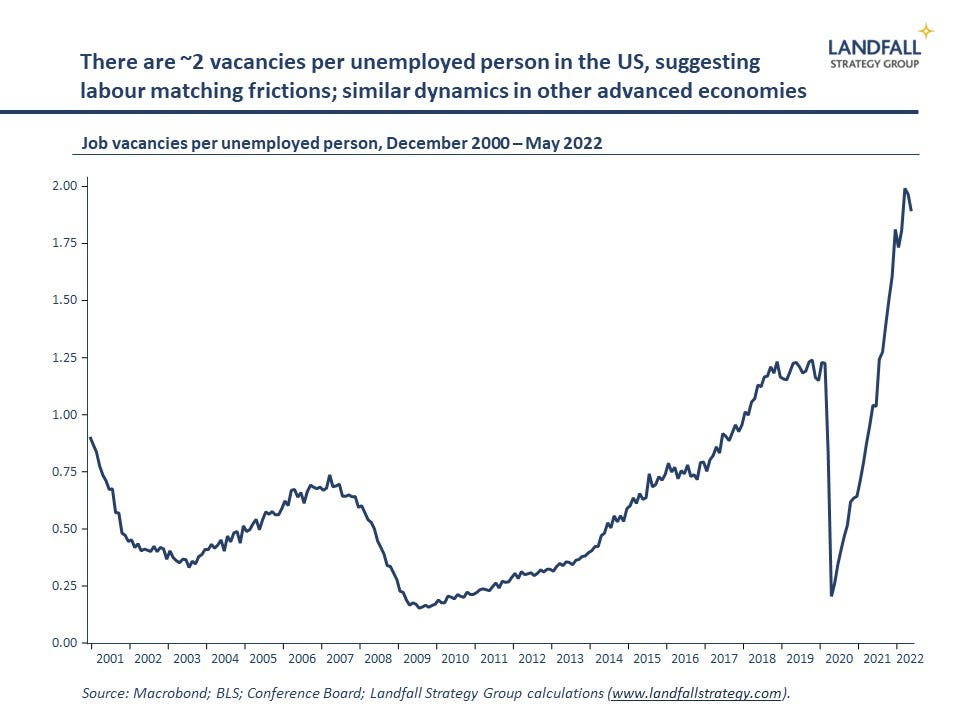By David Skilling*
‘If the only tool you have is a hammer, it is tempting to treat everything as if it were a nail’, Abraham Maslow.
The US reported 9.1% inflation this week, the highest since 1981, with the Fed now scrambling to respond: markets are pricing a rate hike of 75 basis points or more later this month. Surging inflation, and tightening monetary policy, is common across advanced economies and beyond.
This is partly an excess demand story, due to the strong economic recovery from Covid – supported by aggressive monetary and fiscal policy stimulus. And rising energy and food costs have made a substantial recent contribution.

More broadly, Covid has had an enormously disruptive effect on the functioning of advanced economies: global supply chain frictions, changed business models, dislocations in labour markets, and so on. Combined with the strong recovery, these supply side constraints have generated inflationary pressure.
Indeed, inflation is importantly about structural dynamics. Factors such as globalisation, demographics, and technology have placed significant downward pressure on inflation over the past few decades. The Great Moderation has not just been due to central bank actions. And monetary policy alone cannot deal with some of the structural drivers of inflation that are currently at work.
All advanced economies have inflation that is well above target levels. But there is variation in core inflation, excluding the contribution from food and energy prices. At the top are the US and the UK, as well as New Zealand. Many European economies have lower core inflation.
This is partly a function of the strength of the recovery and the extent of stimulus. But I’m struck that the economies that have high core inflation tend to have particularly acute labour market challenges.
Where have the workers gone?
Labour market performance across advanced economies through the pandemic has been strong, with unemployment rates not spiking up (ex the US) – largely because of aggressive policy measures. And unemployment rates are now sitting at relatively low levels, generally below immediately pre-Covid levels.
But there is meaningful variation across advanced economies in terms of underlying labour market tightness. For example, employment levels in Europe are well above pre-Covid levels, whereas the US has only just regained these levels – and the UK still has markedly lower levels of employment. This constrained labour supply reflects reduced labour force participation rates in the US and UK relative to Europe: the shares of the population in the US and UK labour markets have reduced through the pandemic.

The great resignation was real, at least in some economies, with people leaving the labour market: early retirement, sickness/childcare reasons, changed work/life preferences, and so on. Note also that policy approaches that kept people attached to the labour market through the pandemic have done better than the US, where layoffs were higher.
Another factor contributing to tight labour markets is reduced migration inflows. Australia and New Zealand, for example, have maintained high participation rates and low unemployment rates through the pandemic. But net migration inflows, which accounted for meaningful shares of working age population growth in these countries, went to zero during Covid. Because of this, labour supply growth in these economies is much weaker than pre-Covid rates, leading to labour shortages.
This is also the case in the UK, where Brexit has contributed to constrained employment growth and labour shortages. And in the US, the share of migrants in the labour force has reduced through Covid.
These labour shortages have created supply side constraints at the same time as demand is booming, constraining output and creating price pressures. Economies that have flexible labour markets with support for workers to stay in the labour market have done better in avoiding some of these supply side constraints.
Labour markets, disrupted
At a micro level, there has been substantial job churn through the pandemic. Workers have been voting with their feet, by quitting for jobs with better pay and conditions.

In addition, the location and nature of jobs has also changed through the pandemic: there are new areas of labour demand (from logistics to digital) and some sectors with reduced demand (physical retail). This will require an at-scale reallocation of labour across the economy as the supply and demand of labour is aligned across sectors.
This process will inevitably involve costs and frictions as people and firms search for each other. One measure of the efficiency of the labour market search process is the ‘Beveridge curve’, which maps the number of vacancies against the unemployment rate. In many advanced economies, this curve has shifted out markedly (more job vacancies for every unemployed person), suggesting structural changes in labour markets. In the US, the ratio currently sits at ~2 vacancies for every unemployed person.

Economies that make strong investments in skills, have active and flexible labour market policy, and where firms are directly involved in the skills process (such as apprenticeships, vocational learning) should have an edge in this environment. Small advanced economies, many of which have these characteristics, are able to productively employ relatively large shares of their populations.
Demand v supply side policy
The scale of the economic shock of Covid inevitably meant that the recovery process would be bumpy. Labour markets are a key domain in which this is playing out, with implications for inflation.
Wage growth remains negative in real terms across advanced economies, with aggregate wage growth not keeping pace (yet) with inflation. But tight labour markets also affect product markets, creating shortages of products and disrupting supply chains – with consequent cost and price pressures. And the frictions between labour demand and supply also impose additional costs on firms.
Those economies that have been able to maintain labour supply growth, and help workers to efficiently move into new jobs, will have greater productive potential – weakening the inflationary pressures due to the mismatch between demand and supply. The Nordics, the Netherlands, and Switzerland are good examples.
Tighter monetary policy is needed to reduce excess demand. But pulling demand down to meet weaker supply can be self-defeating. Measures to push out the supply side of the economy are an important part of responding to inflation. And key to this will be ensuring that labour markets are working well: skills and training, flexibility, supporting conditions (childcare, minimum wages, etc).
Some economies, such as Singapore, are actively engaged in upgrading skills for the new demands of the post-Covid economy. But these supply-side policy efforts should be more widespread.
Looking forward
Favourable demographics, strong migration flows, the introduction of flexible labour markets, as well as import competition, have combined to support labour supply growth and dampen wage growth over the past few decades. The Philips curve famously disappeared.
But beyond immediate post-Covid stresses, structural changes in the global economy are leading to changes in this context.
Ageing populations across advanced economies and beyond (notably China), as well as likely lower migration levels in some advanced economies, means that labour supply growth is likely to be structurally lower. This will create wage and price pressures that can’t easily be tamed by tighter monetary policy. Milton Friedman was not entirely correct.
‘Inflation is always and everywhere a monetary phenomenon’, Milton Friedman.
Governments will need to find supply-side measures to respond to these pressures, through labour market and skills policy, as well as encouraging the adoption of productivity-enhancing technologies such as automation. The demand-side hammer of monetary policy cannot be the only solution.
*David Skilling ((@dskilling) is director at economic advisory firm Landfall Strategy Group. The original is here. You can subscribe to receive David Skilling’s notes by email here.
53 Comments
Automation requires skilled workers to set up the automation.
Why automate when labour is cheap and plentiful? Our immigration policy undermines the investment case for improving productivity as the productivity commission pointed out.
Because cheap and plentiful labour can no longer afford to live here due to the cost of living.
Bring down house prices....and yes no problem.
But high house prices, expensive rents, and rising interest rates, means that this is not a place to be if you earn the minimum wage of just above.
I'll let you in on a secret, you don't want to be part of a cheap and plentiful labour force anywhere, irrespective of house prices.
But we are willing to exploit those people, to fill the roles that locals can't afford to do, by importing them from overseas?
Sounds like a modern from of slavery...
Depends how you want to look at it.
Can the locals not afford to do these jobs, or do they not want to? Many of them pay double or more the minimum wage. Triple, while the country was closed due to covid.
They wouldn't go through the expense of coming if it didn't work out for them.
They come because at least here they have an opportunity for them or their kids to escape poverty. Just because their is a chance of manumission doesn't stop it being slavery.
I'm starting to get confused now whether people are talking literal slavery or just the requirement to work to live.
It is a family investment when both your parents get the pension after providing free child care ten years after getting here........
Not our immigration policy, our whole economy and society is still based on the notion of close to 100% employment.
We have nearly a quarter of a million people employed in physical retail. I'd argue that's now mostly a job that doesn't need to exist outside of satisfying existing economic models, and legacy requirements by mostly our aged population of needing to deal with a physical person.
We're at the bumpy beginning of what is going to become a global economic depression.
It could take 5 years to bed in, or more unexpected Black Swan events like Russia v Ukraine, COVID pandemic gyrations, resource wars, ships getting stuck in the Seuz canal, cyber warfare, Germany's idiotic policy choices around energy, terrorist attacks or natural disasters knocking out key infrastructure could spike oil prices over $200-300 per barrel in short order, creating supply chain chaos and economic fallout.
If you care about the future of this country, don't vote National.
Personally I have been contemplating voting Maori Party, as at least the Tangata Whenua have a more genuine understanding of sustainable living through protecting the environment. The Greens are too hooked on the fallacy of 'Green growth' and TOP do not have a coherent brand or message that will see them crest 5%.
The tangata whenua supremacy party's idea of sustainability is to poison everyone else with Karaka berries. Or so they "joke".
Brock,
That's simply untrue-and you know it. Semour's fake outrage now is in stark contrast to his views on Cameron Luxton's suggestion that Anne Tolley be beheaded. Neither comment should have been made; these were jokes in very bad taste.
Which part is untrue? These people are unabashedly pushing for racial privilege and an ethno-state and are "joking" about killing off those that don't agree with them. What happens if they hold the balance of power is terrifying. They are the lunatic fringe.
Don't know about Luxon beheadings, and neither does Google, he's in some other political party again right? There's an extra level of indirection in that whataboutism.
It was LUXTON, Act party member, not LUXON. Note that linklater said Luxton.
https://www.sunlive.co.nz/news/294165-acts-off-her-head-comment-unfortu…
What happens if they hold the balance of power is terrifying. They are the lunatic fringe.
Yes, the prospect of ACT being in power is terrifying.
Thanks for that clarification. As I have nothing to do with Act or National and I'm not a paid political shill I'm not very well acquainted with every single thing that every minor politician has ever said.
As far as I can tell Act just believes in libertarianism instead of racial supremacy so it's a bit less terrifying.
I'm trying to think of anything over the last hundred years or so that's been less racially prejudicial as imposing market economies on communal cultures.
"You guys share everything? Welcome to dog eat dog, baby".
Sounds like an improvement over tribe eat tribe.
That's precisely what we've ended up with.
Then the winning tribe members complain if anything is done to try and tip the losers' odds.
You're right, that's been one of the most ethically evil things that have happened on a wide scale by humanity as a whole within the last 500 years.
Coming into areas and imposing foreign economic and governmental forms on local populations, leveraged by superior technology to steal their lands and resources, generally with little no to no recompence.
You are welcome to leave, anytime, in order to make things right with us.
Tribe eat tribe was eradicated in the 1800s.
We just made bigger tribes and changed the rules.
Here, here's this system that's radically different, some of you will swim, many will sink, but I'm alright Jacko. You guys can aspire to be sports stars and rappers.
As I have nothing to do with Act or National and I'm not a paid political shill I'm not very well acquainted with every single thing that every minor politician has ever said.
Neither. That's why I used google, with the information in linklater01's comment to find the article that talked about it, which I had never heard of myself, just as you had not.
But then I know how to use google properly.
You must have confused me with somebody who cares what some obscure minor politician uttered once.
Please bear in mind the rest of us aren't paid political shills.
Brock, I've already told you that I'm not going to waste my time or effort on trolls any more.
Luckily in this instance linklater01 has already provided the factual response to your latest whine.
Note that I don't have any issue having mature discussions with people who hold different views to my own - and I've have done this a few times on interest.co.nz within the last few weeks.
But I'm done responding to trollish comments.
If you have genuine things you'd like to discuss, then don't write your comments like a troll would. Use more words - you are clearly capable of it.
Hi Labourthide,
It's my understanding that paid advertisments need to be clearly marked as such under New Zealand law.
Something to think about each time you shill for the Lie-bour party and their lunatic fringe associates.
Be kind!
Pot...Kettle. you're all over Stuff trolling as well
Personally I have been contemplating voting Maori Party, as at least the Tangata Whenua have a more genuine understanding of sustainable living through protecting the environment
Every time Rawiri Waititi opens his mouth, "genuine understanding" and "sustainable" are not really applicable terms.
I don't think the Maori Party represent Maori, and they serve Maori interests poorly.
Thanks for that viewpoint, I'll keep my antenna tuned to articles that discuss general Maori attitudes to Ti Paati Maori.
Hey "Paati" sounds awfully similar to "Party".
I hope they haven't been culturally appropriating evil colonial words.
They'll just cherry pick all the good bits out of colonialism.
That sounds like a sensible approach. Not sure if you meant it that way.
The english language is 80% "borrowed" from other languages in the same manner fyi.
If you care about one person one vote, equal rights and access to ‘tax-payer funded’ public services based on need rather than bloodline (perceived or real) THEN DON’T VOTE LABOUR (or the Maori party - which in substance is racist)
Wait to finish off this thought you need to then complain about crime and how innate criminal behaviour is to colonised indigenous populations and then stare blankly through your hypocrisy.
People should just chose to be white and middle class. Duh.
I think it's a sad climate in New Zealand currently where airing opposition to race based law and governance will label you a racist.
Its obviously a sensitive subject that holds some emotion for many.
That said, you engage in a protracted discussion with someone objecting to attempts to try and balance things, 9 times our of 10 eventually they're going to say something bigoted.
Who’s talking of crime? Straw man arguments come from those who have no rebuttal
It's true, your points are so flawless I have no rebuttal.
Far be it for me to continue down the very stereotypical route you drum up, I guess I shouldn't assume the rest but it's quite plain what sort of Hobson's Pledge style argument you're dredging up.
Wait to finish off this thought you need to then ...
This is textbook https://en.wikipedia.org/wiki/Straw_man .
Core inflation, all I know is that the green kiwifruit that I bought on the last two occasions did not ripen.
Yep, same. They pick them too early, bloody waste of money.
LOL, I love kiwifruit, but I find that they take ages to ripen and then I forget to check the few days when they are perfect and they get over ripe - Doh. To compound my misery, I planted a male and a female kiwifruit vine to grow my own and when one died I realised that I didn't record which was which - damnation.
The next time the survivor flowers, take a close look at them. Female flowers should have a big-arse middle bit and polleny fluffy bits around the outside (but they are sterile), and males should only have lots of sticky out fluffy bits around the outside. I hope my answer was not too technical and fancy pants to follow. If so, see following:
Male and female flowers – Kiwifruit – Te Ara Encyclopedia of New Zealand
When you strip out food and energy from our CPI calculations, the data does not support the conclusion that a tight labour market is playing a role in NZ inflation. The big drivers of inflation (other than energy and food) are: Cost of getting a house built, rent, second hand cars, local authority rates, real estate fees, cigarettes and tobacco, electronic games, and property maintenance. Together these categories account for almost all of the non-food and energy inflation. Do price increases in these categotries suggest a tight labour market? Are we desperately short of real estate agents?
As ever, high level analysis of global economic data tends to produce high level reckons that are unhelpful (and can lead to dangerously misinformed action).
Don't vote for one of the big 4 parties.
"Measures to push out the supply side of the economy are an important part of responding to inflation."
Well, not putting rocks in the path of supplying core commodities (which cannot be printed into existence) like wheat, milk, oil, minerals and timber is about the best that gubmints can do.
But that means swallowing a whole lotta deceased rodents, and deep-sixing ESG plus a host of other Current Things.
So, not gonna happen.
I enjoyed your analysis. Governments do seem to be pushing to reduce inflation, President Biden cut a deal with the Saudis on oil and our own government cut petrol taxes temporarily for example.
However I hope we don't see the return of the migrant worker low wage, low productivity cycle. We might not have "built back better" after the pandemic but there is no need to repeat the mistakes of yesteryear. Real wages have been devastated by uncontrolled inflation in New Zealand and that battle appears far from over, we need a few years of clear air to let wages come back to pre-pandemic levels before we lower the bar on immigration. I say this and I'm an immigrant myself.
President Biden cut a deal with the Saudis on oil ..
Only works while free passage of middle east oil tankers persist.
A war to contain Iran would suspend free passage.
On July 14 in Jerusalem, Yair Lapid and Joe Biden signed a declaration on strategic partnership. In particular, it notes that the US intends "to work together with other partners to confront Iran’s aggression and destabilizing activities." Link
America's endemic hypocrisy & self interest on full display:
Saudi Arabia: The significance of Biden’s fist bump with crown prince – https://www.bbc.co.uk/news/world-middle-east-62189543

We welcome your comments below. If you are not already registered, please register to comment
Remember we welcome robust, respectful and insightful debate. We don't welcome abusive or defamatory comments and will de-register those repeatedly making such comments. Our current comment policy is here.